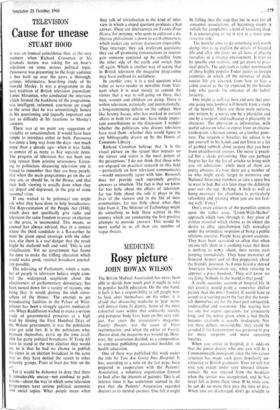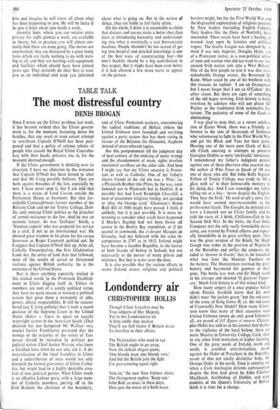Rosy picture
MEDICINE JOHN ROWAN WILSON
The British Medical Association has never been able to decide how much part it ought to take in popular health education. On the one hand, it feels it has a responsibility to tell people how to look after themselves; on the other, it is afraid that discussing medicine in `pop' terms will detract from its dignity. Some of the most colourful rows within that ordinarily starchy and pompous body have been on this very sub- ject. For years the association's magazine, Family Doctor, was the cause of bitter recrimination, and when the editor of Family Doctor died, the magazine was wound up. How- ever, the association decided, as a compromise, to continue publishing occasional booklets on health education.
One of these was published this week under the title So You Are Going Into Hospital. It has, according to a note on the last page, been prepared in cooperation with the Patients' Association, a voluntary organisation formed to look after the interests of patients. This is of interest since it has sometimes seemed in the past that the Patients' Association regarded doctors as its natural enemies. One felt it might
be falling into the trap that lies in wait for all consumer associations, of becoming simply a
vehicle for complaints, a kind of knocking shop. It is encouraging to see it cast in a more con- structive role.
The booklet aims to do something well worth doing; that is. to explain the details of hospital life and allay the fears we all have at placing ourselves in a strange environment. It tries to
be specific and realistic, and get down to prac- tical details. The approach is rather reminiscent of those highly popular Fodor guides to foreign
countries, in which all the minutiae of daily tourist life are covered, from how to hire a cabin cruiser to the tip expected by the hirsute lady who guards the entrance of the ladies' lavatory.
One might as well say here and now that any- one going into hospital will benefit from a study of the booklet. There are three main sections, one written by a nurse, one by a physician and one by a surgeon, and each essay is pleasantly in character. The physician is informative, with useful advice on what to expect from an electro- cardiogram. a barium enema, or a lumbar punc- ture. The surgeon is breezier; his advice is to put yourself in his hands and not listen to a lot of garbled rubbish about surgery that you hear from unauthorised sources. The nurse is practi- cal but a shade patronising. One can perhaps forgive her for the list of articles to bring with you on admission : while most of them are pretty obvious, it's true there are a number of us who might easily forget to memorise our National Insurance numbers or take a spare bra to wear in bed. But at a later stage she definitely goes over the top. 'Bathing. A bath as well as being necessary for cleanliness is particularly refreshing and relaxing when you are not feel- ing well.' Fancy!
One's main criticism of the pamphlet centres upon the rather cosy, 'Listen-With-Mother' approach which runs through it. Any piece of written material which claims as its object the desire to allay apprehension falls nowadays under the immediate suspicion of being a public relations exercise. People have grown cautious. They have been reassured so often that when anyone tells them in a soothing voice that there is nothing to worry about, their nerves start jumping immediately. They have memories of Stansted Airport and all that poppycock about the friendly postman. As I once heard a shrewd American businessman say, when refusing to approve a press handout, 'They will know we are lying. Nobody in the world is that good.'
A really accurate account of hospital life in this country would paint a somewhat chillier picture than the BMA'S booklet. It would have to accept as a starting-point the fact that the hospi- tals themselves are for the most part antiquated, understaffed and run-down. The waiting lists for any but urgent operations are atrociously long, and the notice given when a bed finally becomes available is usually inadequate. Nor are these defects unavoidable; they could be avoided if the Government was prepared to pay for more surgeons and more operating theatres.
When you arrive in hospital, it is odds-on that the junior doctor who sees you will be a Commonwealth immigrant, since the Nits career structure has made such posts hopelessly un- attractive to British graduates. Your Gp will not visit you except under very unusual circum- stances. He was rejected from the hospitals when the service was inaugurated, and he has never felt at home there since. If he visits you, he can do no more than pass the time of day. When you are discharged, don't go straight to
him and imagine he will know all about what has been happening to you. He will be lucky if he gets a letter about you inside a week.
Amenity beds, where you can receive extra privacy for eight guineas a week, are available in theory, but in practice you will almost cer- tainly find there are none going. The nurses are overworked, they are distracted by a great many tasks which are really nothing to do with nurs- ing at all, and they are battling with equipment and facilities which should have been junked years ago. They certainly do their best to treat you as an individual and keep you informed
about what is going on. But in the nature of things, they- are liable to fail fairly often.
On the whole, I think it is reasonable to claim that doctors and nurses make a better shot than most at introducing humanity and understand- ing into what is essentially a vast bureaucratic machine. People shouldn't be too scared of go- ing into hospital and detailed knowledge is one of the best ways of counteracting fear—the BIVIA'S booklet should be a big contribution in this respect. But it might have been even better if it had allowed a few more warts to appear on the picture.















































 Previous page
Previous page